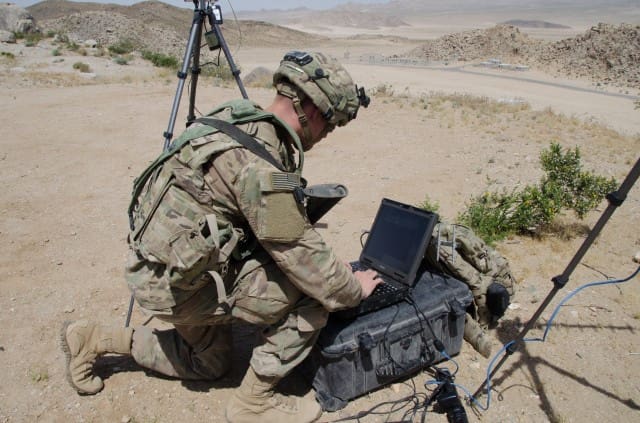ARLINGTON, Va. — The Army’s senior intelligence officer likened intelligence and cyber Soldiers to those in the combat arms since they fight on networks everyday with adversaries.

“Our intelligence professionals and our cyber operators are duking it out,” Lt. Gen. Scott Berrier said. “I kind of think of ourselves, cyber and military intelligence, as sort of combat arms. I know it’s hard to get your head around that, but we’re the ones who are kind of doing that right now.”
Berrier spoke Wednesday as part of the Association of the U.S. Army’s breakfast series on threats the Army is facing in today’s era of great power competition.
RUSSIA
Since the end of the Cold War, the general said Russia has transformed its army to be smaller with new capabilities that it has been able to test in operations in nearby countries.
Using those lessons, he said Russia now uses those capabilities in Syria, which include air and air defense, precision targeting, special operations and contract forces, and intelligence, surveillance and reconnaissance, or ISR.
The capabilities have also created standoff for Russia as it presses back against NATO presence in Europe, he said.
“We’re watching that very, very closely,” Berrier said. “[We] don’t think [Russia] wants to get in a toe-to-toe fight with the U.S. [It] wants to be regionally dominant and to be a global player.”
CHINA
In the Pacific, he said China aims to be a global economic hegemony by 2049, and at same time gain military parity with the U.S. to push American forces out of the region.
“It really [wants] to establish a new world order,” Berrier said. “They are jealous of the economic system that we have.”
The general added that China would one day like to see its currency, the yuan, replace the U.S. dollar as the global currency.
To achieve its ends, China has started to militarize islands in the South China Sea, creating an effective defensive line.
China “would like to control everything out to the first and second island chain and just keep us out,” Berrier said.
Similar to Russia, China has reorganized its army to be smaller with new capabilities in air and air defense, space and ISR using intellectual property it illegally obtained.
“Much of the modernization that [its] been able to accomplish is with technology that [was] stolen from us and our partners,” Berrier said.
China has also carried out a reversal of the Marshall Plan, he said, by going into countries struggling financially and paying off their debt and building infrastructure. As a result, China then sort of owns that country and can place forces and capability inside of it, he said.
“We’ve seen this play out across Africa, we’ve seen it play with our Middle Eastern partners, we’ve seen it play in South America,” he said.
The general noted that by doing this China is also trying to connect markets to its own.
MODERNIZATION
The U.S. Army’s modernization priorities and multi-domain operations doctrine is currently tackling these near-peer threats, he said.
“The modernization that we’re doing for Russia and the modernization that we’re doing for China really will do the same thing for us in both theaters,” he said.

The Army is putting together multi-domain task forces that have I2CEWS — intelligence, information, cyber, electronic warfare and space capabilities — that will allow Soldiers to punch through enemy frontlines.
They “will help us in that boxer stance and be able to get inside, penetrate the ability that they have to keep us out,” he said.
Once complete, multi-domain operations will be backed up by “multi-domain intelligence.”
“So if you want to do MDO, you have to do MDI,” he said. “And in MDI in the future it’s all about the data and how we process and how we pull [artificial intelligence] into that.”
Army intelligence plans to have three layers of upgraded capabilities at the terrestrial, aerial and space levels.
At the terrestrial level, brigades will receive more capability that combines signal, intelligence, electronic warfare and cyber assets.
In the air, he noted, the Army will need a new platform that goes higher and can sense deeper.
And for space, the Army looks to work with its partners to take advantage of assets, whether they’re owned by the government or commercial satellites, to carry out long-range precision fires in coordination with aerial and terrestrial systems.
“Think of this sensor grid, from space to mud, that is connected through multi-domain intelligence using and fusing data at the speed of combat operations,” he said.
Known as TITAN, the Tactical Intelligence Targeting Access Node is a scalable and expeditionary intelligence ground station that leverages space, aerial and terrestrial sensors.
A TITAN space prototype, which is expected to be delivered by fiscal year 2022, is being developed to provide targetable data from these sensors to fire networks.
“TITAN is going to be the ground station that replaces a number of these systems that we have today [and] is central to all of it,” he said.
Story by Sean Kimmons, Army News Service
Photos by Bill Roche, US Army & Luc Dunn, AUSA


Cyber needs to be its own branch yesterday. The services don’t fight differently in “cyberspace” or use different tactics, they’re just wasting budget internally that doesn’t help their core functions. There is unnecessary disparity in budgeting, staffing, training, knowledge, skillsets and manning that should be focused singularly on maintaining “Cyber warriors” that aren’t led by random officers rotating in or out pretending to have any idea what they’re talking about; and a force where the majority bolt for contractor positions ASAP not just for the $$$ but due to that farce of management/expectations.
The logic used for a Space Force is actually a greater case for prioritizing a separate Cyber Force/Corps.
Amen!
x10!
Consider signing a gov petition on the subject: https://petitions.whitehouse.gov/petition/establish-cyber-forcecorp-separate-equal-military-service-branch
Who knows, maybe it’d actually gain traction 😉
“likened intelligence and cyber Soldiers to those in the combat arms”
They tend to do that, all “remote effects” folks need to understand that this does not endear them to the “combat arms” personnel nor their peers, stick to doing what you are good at and you will be respected.
Kind of like that kid on Facebook who says he’s an Operator in Call Of Duty…